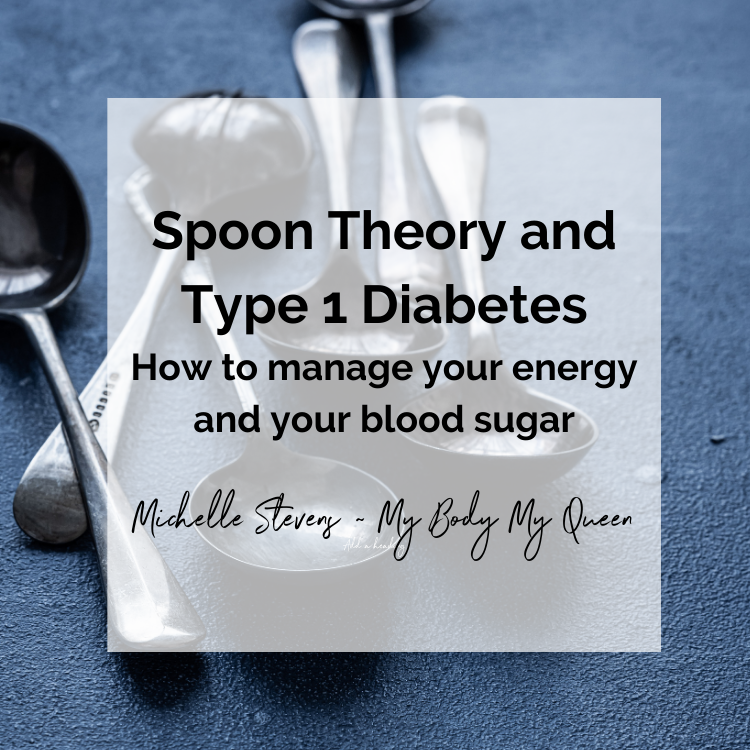
Spoon Theory and Type 1 Diabetes: How to Manage Your Energy and Your Blood Sugar
Counting Carbs and Spoons
Teaspoons of sugar? Tablespoons of syrup? No. No. No. Energy management.
Have you ever heard someone call themselves a “spoonie” or say they are having a “low spoon day”? If so, that person is checking in with their energy levels using Spoon Theory. It’s commonly used with people who have chronic pain but can apply to many people with chronic illness. When a friend told me about Spoon Theory, it felt like someone was finally giving words to my experience as a Type 1 Diabetic for over 28 years. Life did feel harder for me. I knew why, but didn’t want to admit to it. I had tried so hard to pretend like diabetes never slowed me down. It shaped my entire life, even before considering building a career in diabetes education.
A 2014 research study out of Stanford found that patients with Type 1 Diabetes make 180 decisions a day about their diabetes on average. (Shoutout to Dr. Buckingham who diagnosed me and was part of this study!)
Just the thought of that would exhaust mere mortals, but it is the reality for patients with Type 1 Diabetes each and every day. We have to fight off low blood sugars and glucose sensor alarms all night, wake up, and start the daytime balance of food, exercise, and insulin all over again.
We are dealing with fluctuating blood sugars at baseline. Spoon theory can help balance the stress and energy spent managing those blood sugars.
Having been diagnosed with Type 1 Diabetes at the age of 5, there is a constant buzz of type 1 diabetes thoughts running through my brain. Imagine how much bandwidth that takes up. Is this constant hum what shapes my brain and intelligence or could I be even more powerful without this disease taking up mental bandwidth? We may never know. (If there is a cure one day, I’ll definitely have a smaller purse and smaller luggage. It’s going to be so good!)
At the end of the day, Type 1 Diabetics have WAY more concerns than the average person. We’re thinking for an organ and it’s teammates which most people know nothing about. Having to think for your own organs, the pancreas for example, and trying to recreate harmony in a broken system is exhausting.
If you have a chronic illness or three, read on to see how Spoon Theory can help. Yes, even if you are a diabetic superhero.
I know you are highly capable, but you’re still human. Your body will always win and make you take juice box breaks when you push too hard. Spoon theory will help you work with your body. It’ll ease the feeling that there is a battle raging in your body or that your body hates you. My sweet friend, your body is trying to save you by pumping the metaphorical brakes.
If you have a fully functional body, congratulations! Read along to understand what chronic illness warriors in your life may be up against and take a moment to appreciate the privilege of your health. Know that you can use Spoon Theory when your life is in transition and taking more focus and energy away from your day-to-day.
What is Spoon Theory?
Spoon Theory is a way of measuring personal energy. It’s commonly used by people with chronic pain, but I’ve found it incredibly useful with Type 1 Diabetes and my other autoimmune conditions. The Spoon Theory was written by Christine Miserandino. You can read the original work on www.butyoudontlooksick.com along with this article to get a full understanding of the theory.
I love that she named her blog “But You Don’t Look Sick.” More people than you realize have invisible illnesses. We may look like everyone else our age, but have much more complicated medical histories that interrupt and shape our daily life. Many of us have multiple diagnoses. Other autoimmune conditions commonly seen with Type 1 Diabetes are celiac disease, food sensitivities, and Hashimoto’s disease along with depression and anxiety. This is not an exhaustive spoonie list and does not take into account the complications commonly associated with Type 1 Diabetes.
In my experience with autoimmune conditions of Type 1 Diabetes, Hashimoto’s Thyroiditis, asthma, allergies, and food sensitivities it can feel like a battle is raging in my body. Autoimmune literally means that the immune system triggers into overactivity and attacks otherwise healthy parts of the body. The phrase “invisible illness warrior” is incredibly fitting.
With chronic illness, we never know if tomorrow will be a high, low, or medium energy day. This is where Spoon Theory comes in. “Spoons” are a unit of energy. Spoons are not standardized. One person’s day with lots of spoons might be low for another person. More importantly, activities don’t cost the same amount of spoons for everyone. Showering and getting dressed will cost more spoons for someone with chronic pain than someone with no pain. For people with diabetes who are insulin-dependent, every meal and snack costs us more spoons than the average person because we need to guess/ estimate the carbohydrate amount, calculate the insulin dose accordingly, and monitor for the next two hours to see if we were right.
When is Spoon Theory helpful for people with Type 1 Diabetes?
A spoonie flareup for Type 1 Diabetes can be any number of things, but I especially equate it to the roller coaster blood sugar days.
Situations that can cause a flare-up or low spoon day in Type 1 Diabetes:
- Waking up in the middle of the night to drink juice because your blood sugar went low
- Waking up in the middle of the night to go to the bathroom (again) and drink water because your blood sugar was high
- Your glucose sensor or insulin pump disturbs your sleep and alerts you of something that could have waited until the morning
- You start a new glucose sensor and need to do calibrations. The first 24 hours are always more difficult.
- Your blood sugar goes low multiple times a day and leaves you in a brain fog
- Your blood sugar is resistant to dropping no matter how much insulin you use to correct it, keeping you in a brain fog and moody
- Your blood sugar drops at the worst possible time hours later (probably while sleeping) because all of that insulin finally starts to work
- You forgot supplies at home and desperately need them
- You stress about how you will pay for your insulin, supplies, and the doctor visits to get the prescriptions in the first place
- Monthly menstrual cycle hormone changes leading to blood sugar changes
- Dealing with chronic pain, whether from complications or another diagnosis
Why exercise doesn't boost energy for people with Type 1 Diabetes
No. No, it does not. Many people look to exercise as a way to boost energy. Yes, a body in motion stays in motion, but a Type 1 Diabetic body in motion requires constant monitoring.
Spoon Theory helps explain why exercise is not stress-relieving for people with Type 1 Diabetes. It is stress-inducing, especially when you’re first increasing your activity.
Exercise leads to the muscles working harder and requiring refuel. Muscles are pretty cool and can work like insulin to pull sugar from the bloodstream. Because the muscles start doing the task that insulin already does, less insulin is necessary.
In a non-diabetic body, the pancreas notices this change and decreases the amount of insulin produced. In an insulin-dependent body, the patient needs to think for their pancreas and decrease the amount of insulin they are injecting.
That may seem pretty straight-forward except that the effect of exercise on blood sugars lasts for 24-48 hours. The effect of exercise on insulin depends on many factors, such as:
- type of exercise
- intensity of exercise
- time spent exercising
- time of day when the exercise happened
- current status of the patient as insulin resistant or sensitive
Of note, exercise doesn’t always decrease blood sugar and create a low. Some types and intensities of exercise increase adrenaline and will increase blood sugar for a period of time.
There’s a lot of mental gymnastics that goes into even a quick, spontaneous, 30-minute walk. Exercise as a person with diabetes is so important whether insulin-dependent or not. As an insulin-dependent person with diabetes exercise requires more energy, aka spoons. As fitness levels increase so does the body’s reaction to exercise as insulin sensitivity levels change.
Basically, exercise and diabetes will keep you guessing, especially if your weight or muscle-to-bodyfat ratio changes because of it.
I designed Spoonful of Fitness around my experiences with exercise and Type 1 Diabetes. In this workshop, you’ll learn how to increase your activity level gradually. You actually start with more rest days than workout days! This is great if you have a diagnosis that is affected by exercise, you’re increasing your activity level, or experiencing a lot of muscle soreness after workouts.
Why is Spoon Theory helpful for people with Type 1 Diabetes?
In short, having diabetes is stressful. Type 1 Diabetes is reactive to our food, activities, and emotions. It also has a mind of its own and will change for little reason, usually as soon as a blood sugar trend has been found and treated. Stress, whether from life or diabetes management, leads to cortisol, which leads to insulin resistance and makes managing blood sugars more difficult. The more we can learn to live in harmony with diabetes without being hypervigilant, the less stressful it is, which makes the whole body run better.
Spoon Theory can help a person with Type 1 Diabetes explain to their loved ones, teachers, coaches, or colleagues that they are having a difficult day. We have to manage our blood sugars 24/7 and can live full lives like everyone else, but we have our difficult days that make it harder to do our best. Overall, I see the T1D community put so much effort into being like everyone else. That alone is depleting. We can do a lot, but it takes extra energy to make it happen. Personally, I felt a weight lift off my shoulders when I could be 100% honest with myself and those around me about my needs and energy levels.
Spoon Theory also helps people with Type 1 Diabetics with other conditions balance them all. Personally, it helped me prioritize and make decisions about my eating. From an energy perspective, honoring my food sensitivities and eliminating soy, dairy, and gluten from my diet has a much greater impact on my hormones than a meal plan specifically for blood sugar management.
If you suspect that you have food sensitivities, check out Spoonful of Nutrition for a simpler approach to traditional elimination diets and complicated protocols that won’t drain your spoons.
How to Plan Your Day with Spoon Theory (and changing those plans as needed)
The point of Spoon Theory is to make sure that we use our spoons for the day wisely. As we practice awareness of our energy, we start to understand what drains our spoons and under what conditions. Unfortunately, that can mean a lot of cancelled plans, no matter how much we want to follow through. What might seem like a small get-together can still cost someone else a lot of energy that they don’t have or can’t afford to lose.
On low spoon days, conservation is key. Plans will get cancelled whether we like it or not on low spoon days so that there is still enough energy at the end of the day to take care of basic tasks of survival. If we overuse our spoons, we end up depleted and will likely have a flare up of symptoms, which creates more low spoon days. For example, when I am overusing my energy, I have asthma flare-ups and end up with a cough that can turn into bronchitis within a few days. When my body is fighting off an illness, my blood sugars rise from the stress.
On medium and high spoon days, we have to be careful to not overuse spoons that would create a low spoon day. Plans can get cancelled here, too. Being overly optimistic about our abilities in a day or weekend, can backfire on us quickly.
It’s important to keep in mind that many of us with chronic illness can’t just sleep and recharge. We don’t bounce back like “normal” healthy people. (Is anyone normal? Another topic for another day.)
It’s important to not overbook under normal circumstances. Spoon Theory helped make managing my schedule easier and part of my self-care. Maintaining boundaries became easier when done to support my physical health.
How to Prevent Diabetes Burnout with Energy Management
In 2014, my cover was blown. Everyone found out that I wasn’t a perfect diabetic. In February, I had started a detox diet made of real foods and supplements. I thought if I was 100% dedicated for those 3 weeks that I could start losing weight and fixing my digestive system. It didn’t work out that way. The shock to my system from changing my diet drastically led to a misdiagnosis, then the actual diagnosis, of an underlying condition. A month and a half after being on the wrong medication, an infection started taking over my digestive system that almost cost me my life.
In April 2014, I had a near-death experience from attempting to sleep off what I thought was the flu, like any normal person would do. I am not a normal person though. My blood sugars went dangerously high as my body was stressed fighting an infection. This scenario led to a 3-day coma, DKA (diabetic ketoacidosis), heart failure, pneumonia, and C. diff. I’ll never allow myself to reach that level of burnout ever again. I may never have been in that scenario if I had known about Spoon Theory before. I may never have attempted the detox diet that put me in that situation.
Thanks to Spoon Theory, I’ve been able to recover from burnout, live peacefully with the special maintenance of my body, and maintain a social life without overdoing it. Being an extroverted social butterfly, learning about Spoon Theory helped save my life a second time. Without it, I surely would have said “yes” too often to social events that messed up my sleep schedule and blood sugars, along with continuing the cycle of 2 weeks of mystery illnesses every few months that flared up my asthma symptoms. With Spoon Theory, I’ve been able to find the right balance between maintaining my friendships and my health.
Spoon Theory taught me to be honest about my current circumstances on a daily basis and check in with my body. It taught me how to give myself grace. I still push myself but now I know how to respect my upper- limits. Self-care has become incredibly important for maintaining my spoons. (Polishing them, if you will.) I would have not recovered from burnout without it.
If you are living with chronic illness, start testing out Spoon Theory in your life. Take note if you wake up with low, medium, or high energy. Pay attention to what drains your energy throughout the day or takes more effort. Notice how you feel at the end of the day. This is all data collection. It takes time, but you start to learn what unavoidable energy-draining tasks need more planning around. You can use this information to plan better in the future.
I talk about this more in-depth in Declare Your New Normal to help you plan your week around your energy and adjust as needed. Spoon Theory is designed for chronic illness but also helps when life is in transition. In Declare Your New Normal you’ll learn how to add healthy activities and self-care to your life, even in a pandemic.
Will you be testing out Spoon Theory in your own life? Message me on Instagram and let me know.
Don’t worry. you don’t have to call yourself a spoonie if you don’t want to. That being said, it is pretty fun to meet other spoonies, just like finding someone else with an insulin pump when you’re at Target. 😉
Michelle Stevens
Michelle is a Type 1 Diabetic, dancer, and fitness professional with certifications in personal training, clinical exercise physiology, and group fitness. She is also certified as a level 2 Diabetes Care and Education Specialist with published research in Diabetes Care. Michelle has lived the Type B lifestyle of Southern California, the Type A lifestyle of DC, and has happily found her balance in Pennsylvania where she creates dance videos from her basement turned fitness studio.


